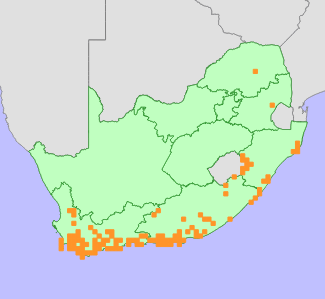| Scientific Name | Schoenus cuspidatus Rottb. | Higher Classification | Monocotyledons | Family | CYPERACEAE | Synonyms | Tetraria cuspidata (Rottb.) C.B.Clarke |
National Status | Status and Criteria | Least Concern | Assessment Date | 2020/03/03 | Assessor(s) | D. van der Colff & L. von Staden | Justification | This species is widespread [extent of occurrence (EOO) 790 681 km²] and not in danger of extinction. It is therefore listed as Least Concern. |
Distribution | Endemism | Not endemic to South Africa | Provincial distribution | Eastern Cape, KwaZulu-Natal, Limpopo, Mpumalanga, Western Cape | Range | This species occurs from the Cederberg in the Western Cape to the Cape Peninsula and eastwards to the Mpumalanga and Limpopo Drakensberg escarpment. |
Habitat and Ecology | Major system | Terrestrial | Major habitats | Cape Winelands Shale Fynbos, Peninsula Sandstone Fynbos, Cederberg Sandstone Fynbos, Kouga Grassy Sandstone Fynbos, Kouga Sandstone Fynbos, Tsitsikamma Sandstone Fynbos, South Langeberg Sandstone Fynbos, North Langeberg Sandstone Fynbos, Kogelberg Sandstone Fynbos, Hawequas Sandstone Fynbos, Canca Limestone Fynbos, Agulhas Limestone Fynbos, Peninsula Shale Renosterveld, Elgin Shale Fynbos, Overberg Sandstone Fynbos, Peninsula Shale Fynbos, Garden Route Granite Fynbos, Peninsula Granite Fynbos, Boland Granite Fynbos, Hangklip Sand Fynbos, Cape Flats Sand Fynbos, Central Coastal Shale Band Vegetation, Western Coastal Shale Band Vegetation, Northern Inland Shale Band Vegetation, Swartland Alluvium Fynbos, Hartenbos Dune Thicket, Garden Route Shale Fynbos, Lesotho Highland Basalt Grassland, Southern Drakensberg Highland Grassland, Overberg Dune Strandveld, Drakensberg-Amathole Afromontane Fynbos, uKhahlamba Basalt Grassland, Cape Flats Dune Strandveld, Drakensberg Afroalpine Heathland, Drakensberg Foothill Moist Grassland, Swellendam Silcrete Fynbos, Amathole Montane Grassland, Suurberg Quartzite Fynbos, Amathole Mistbelt Grassland, Eastern Inland Shale Band Vegetation, Northern Drakensberg Highland Grassland, Breede Shale Fynbos, Maputaland Coastal Belt, Elim Ferricrete Fynbos, Knysna Sand Fynbos, Suurberg Shale Fynbos, Breede Alluvium Fynbos, Albertinia Sand Fynbos, Eastern Ruens Shale Renosterveld, Pondoland-Ugu Sandstone Coastal Sourveld, Eastern Coastal Shale Band Vegetation, Sundays Valley Thicket, Goukamma Dune Thicket, Bhisho Thornveld, Loerie Conglomerate Fynbos, South Eastern Coastal Thornveld, Breede Shale Renosterveld, Humansdorp Shale Renosterveld, Sundays Arid Thicket, Baviaans Valley Thicket, South Outeniqua Sandstone Fynbos, Western Ruens Shale Renosterveld, St Francis Dune Thicket, Albany Valley Thicket, Blombos Strandveld, Groot Brak Dune Strandveld, Nanaga Savanna Thicket, KwaZulu-Natal Sandstone Sourveld, Mamabolo Mountain Bushveld, KwaZulu-Natal Coastal Belt Thornveld, Elands Forest Thicket, Grahamstown Grassland Thicket, Cape Lowland Alluvial Vegetation, Kasouga Dune Thicket, Sundays Mesic Thicket, Hamburg Dune Thicket, Subtropical Alluvial Vegetation, Fynbos Riparian Vegetation, Upper Karoo Hardeveld, Maputaland Wooded Grassland, North Outeniqua Sandstone Fynbos, Central Ruens Shale Renosterveld, Mossel Bay Shale Renosterveld, Ruens Silcrete Renosterveld, South Hex Sandstone Fynbos, North Hex Sandstone Fynbos, Matjiesfontein Shale Renosterveld, Olifants Sandstone Fynbos, Algoa Sandstone Fynbos, South Swartberg Sandstone Fynbos, North Swartberg Sandstone Fynbos, Woodbush Granite Grassland, Graafwater Sandstone Fynbos, Central Inland Shale Band Vegetation, Potberg Sandstone Fynbos, Albany Mesic Thicket, De Hoop Limestone Fynbos, Greyton Shale Fynbos, Barberton Montane Grassland, South Sonderend Sandstone Fynbos, Agulhas Sand Fynbos, Dry Coast Hinterland Grassland, Moist Coast Hinterland Grassland, Mooi River Highland Grassland, South Rooiberg Sandstone Fynbos | Description | It occurs in a variety of habitats, and is found most often on rocky slopes, but also including stream sides, wetlands and seeps. |
Population | Population trend | Stable |
Assessment History |
Taxon assessed |
Status and Criteria |
Citation/Red List version | | Tetraria cuspidata (Rottb.) C.B.Clarke var. cuspidata | Least Concern | Raimondo et al. (2009) | | Tetraria cuspidata (Rottb.) C.B.Clarke var. lorea (Nees) C.B.Clarke | Least Concern | Raimondo et al. (2009) | |
Bibliography | Elliott, T.L. and Muasya, A.M. 2017. Taxonomic realignment in the southern African Tetraria (Cyperaceae, tribe Schoeneae; Schoenus clade). South African Journal of Botany 112:354-360.
Gordon-Gray, K.D. 1995. Cyperaceae in Natal. Strelitzia 2:1-218. National Botanical Institute, Pretoria.
Levyns, M.R. 1947. Tetraria and related genera, with special reference to the flora of the Cape Peninsula. Journal of South African Botany 13:73-93.
Manning, J.C. and Goldblatt, P. 2012. Plants of the Greater Cape Floristic Region 1: The Core Cape Flora. Strelitzia 29. South African National Biodiversity Institute, Pretoria.
Raimondo, D., von Staden, L., Foden, W., Victor, J.E., Helme, N.A., Turner, R.C., Kamundi, D.A. and Manyama, P.A. 2009. Red List of South African Plants. Strelitzia 25. South African National Biodiversity Institute, Pretoria.
Retief, E. and Herman, P.P.J. 1997. Plants of the northern provinces of South Africa: keys and diagnostic characters. Strelitzia 6. National Botanical Institute, Pretoria.
Vlok, J. and Schutte-Vlok, A.L. 2010. Plants of the Klein Karoo. Umdaus Press, Hatfield.
|
Citation | | van der Colff, D. & von Staden, L. 2020. Schoenus cuspidatus Rottb. National Assessment: Red List of South African Plants version 2024.1. Accessed on 2026/02/19 |
 Comment on this assessment Comment on this assessment
|
 © J.H. Vlok/A.L. Schutte-Vlok
Search for images of Schoenus cuspidatus on iNaturalist
|
 Comment on this assessment
Comment on this assessment

